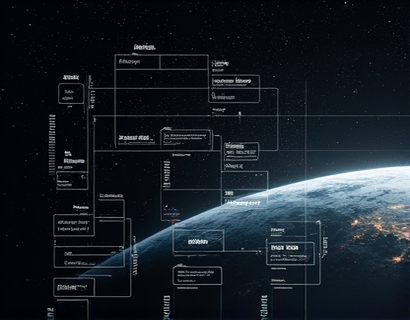Advanced Analytics and Collaboration Tools for Optimal DAO Governance and Growth
In the rapidly evolving landscape of decentralized ecosystems, Decentralized Autonomous Organizations (DAOs) are emerging as a transformative force, offering a new paradigm for governance and management. However, the complexity and scale of DAOs present unique challenges in terms of governance, collaboration, and growth. To navigate these challenges effectively, leveraging advanced analytics and collaboration tools becomes essential. This article delves into how these tools can streamline DAO governance, enhance transparency, and drive sustainable growth, providing DAO managers and administrators with the insights and capabilities needed to succeed in the decentralized world.
Understanding the Importance of Advanced Analytics in DAO Governance
Advanced analytics plays a pivotal role in modern DAO governance by providing deep insights into the organization's performance, member engagement, and decision-making processes. Traditional DAO governance often relies on basic metrics and manual reporting, which can be time-consuming and prone to errors. By contrast, advanced analytics tools offer real-time data processing, comprehensive reporting, and predictive analytics, enabling DAOs to make informed decisions based on accurate and up-to-date information.
One of the primary benefits of advanced analytics in DAO governance is the ability to monitor and analyze member behavior and participation. By tracking engagement metrics such as voting patterns, proposal submissions, and community interactions, DAOs can identify trends and patterns that inform strategic decisions. For instance, identifying inactive members or those who consistently vote against proposals can help governance teams tailor communication strategies and engagement initiatives to boost participation and alignment.
Enhancing Transparency Through Comprehensive Analytics
Transparency is a cornerstone of DAO governance, fostering trust and accountability among members. Advanced analytics tools can significantly enhance transparency by providing clear and accessible insights into financial transactions, proposal outcomes, and operational metrics. Dashboards and visualizations can be customized to display key performance indicators (KPIs) in real-time, allowing members to track the organization's progress and health at a glance.
Moreover, advanced analytics can facilitate auditing and compliance by generating detailed reports and logs of all transactions and decisions. This not only ensures that the DAO operates within its rules and regulations but also provides an audit trail that can be reviewed by members and external stakeholders. By maintaining a high level of transparency, DAOs can build stronger relationships with their community and attract more members and contributors.
Collaboration Tools for Seamless Decision-Making
Effective collaboration is crucial for the success of any DAO, and advanced collaboration tools are indispensable in this regard. These tools facilitate communication, streamline workflows, and enable seamless coordination among members, regardless of their geographical location. By integrating features such as real-time messaging, file sharing, and project management, collaboration tools help break down silos and foster a cohesive community.
One of the key benefits of advanced collaboration tools is their ability to support structured decision-making processes. For example, tools that integrate proposal management systems allow members to submit, discuss, and vote on proposals in a organized and transparent manner. These systems can track the progress of each proposal, display comments and feedback, and provide analytics on voting patterns, ensuring that decisions are made based on collective input and consensus.
Additionally, collaboration tools can enhance the onboarding process for new members by providing them with access to essential resources, documentation, and training materials. This ensures that new members are quickly integrated into the community and can contribute effectively from the start. By fostering a culture of collaboration and inclusivity, DAOs can leverage the diverse skills and perspectives of their members to drive innovation and growth.
Data-Driven Governance for Sustainable Growth
Data-driven governance is at the heart of sustainable growth for DAOs. By leveraging advanced analytics and collaboration tools, DAOs can make strategic decisions that are backed by empirical evidence and member insights. This approach not only improves the quality of decisions but also increases member trust and engagement.
For instance, predictive analytics can help DAOs forecast future trends and challenges, allowing them to proactively adjust their strategies. By analyzing historical data and current market conditions, DAOs can identify opportunities for expansion, optimize resource allocation, and mitigate risks. This forward-looking approach ensures that the organization remains agile and resilient in a rapidly changing environment.
Furthermore, data-driven governance enables DAOs to measure the impact of their initiatives and policies. By setting clear KPIs and regularly reviewing performance data, governance teams can assess the effectiveness of their strategies and make necessary adjustments. This continuous improvement cycle helps DAOs stay aligned with their mission and goals, driving long-term success.
Case Studies: Successful Implementation of Advanced Tools in DAOs
Several DAOs have successfully implemented advanced analytics and collaboration tools to enhance governance and growth. One notable example is a decentralized finance (DeFi) DAO that integrated a comprehensive analytics platform to monitor lending and borrowing activities. By analyzing transaction data and member behavior, the DAO was able to identify high-risk borrowers, optimize interest rates, and improve overall portfolio performance. This data-driven approach not only enhanced the DAO's financial health but also increased member confidence in the organization's ability to manage risks.
Another example is a content creation DAO that utilized collaboration tools to streamline the content production and distribution process. By implementing a project management tool, the DAO was able to assign tasks, track progress, and facilitate communication among writers, editors, and designers. This resulted in a more efficient workflow, higher quality content, and increased member participation. The DAO also used analytics to gauge the performance of different content types, allowing them to focus on high-impact projects and expand their reach.
Challenges and Best Practices in Implementing Advanced Tools
While the benefits of advanced analytics and collaboration tools are clear, DAOs face several challenges in their implementation. One common challenge is the technical complexity of these tools, which can be daunting for members with limited technical expertise. To overcome this, DAOs should prioritize user-friendly interfaces and provide comprehensive training and support to ensure smooth adoption.
Another challenge is data privacy and security. DAOs must implement robust security measures to protect sensitive information and comply with relevant regulations. Transparent communication about data usage and privacy policies can help build trust among members and mitigate concerns.
Best practices for successful implementation include starting with a clear vision and well-defined goals, involving key stakeholders in the selection and customization of tools, and fostering a culture of continuous feedback and improvement. By taking a thoughtful and inclusive approach, DAOs can maximize the benefits of advanced tools and achieve optimal governance and growth.
Conclusion
In conclusion, advanced analytics and collaboration tools are essential for DAOs looking to enhance governance, foster collaboration, and drive sustainable growth. These tools provide the insights and capabilities needed to navigate the complexities of decentralized ecosystems, ensuring that DAOs remain agile, transparent, and member-driven. By embracing these technologies, DAOs can unlock their full potential and thrive in the dynamic world of decentralized organizations.










































